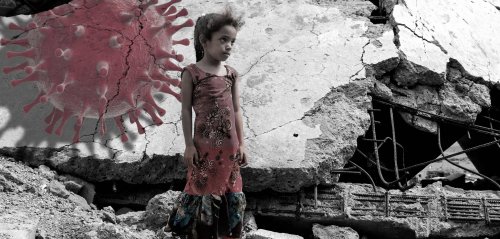On Sunday, June 14th, Egypt recorded its highest daily official Covid 19 death toll: 91, and for the 2nd consecutive day, in excess of 1600 reported cases for the first time since the pandemic roiled Egypt in mid February.
But with Covid-19 the pain does not end here.
Egypt was the sexy choice in neo liberal international circles since the IMF mandated 2016 economic reforms. But this is a Coronavirus world now and this virus has continuously uncovered nations’ underbelly. If Western Europe and the US are being economically walloped by this invisible enemy, imagine the situation in Egypt. The areas of vulnerability are many and with a populace exceeding 100 million, the government stands on the edge of a precipice that could eviscerate three years of economic gains in weeks.
Think of it this way: just as Covid-19 eviscerates the body it attacks the economy, consumer trust and overall corporate health just as viciously.
First, let’s look at the damage being done medically.
As of last week Egypt had registered close to 45000 confirmed Covid19 cases with a death toll of 1600, there has been an increase in testing to 135000. This uptick in testing, while positive, uncovers a lack in testing so severe that it paints a picture of a nation on fire without knowing where the very sources of the fire lie. Everyday, International headlines have blared a lack of testing, leaving some nations flying blind. So while Egypt has recorded its highest fatality count, and highest caseload this week those numbers are but the tip of a hidden infectious spear.
Despite the mushrooming crisis, Egypt has only spent 2% of GDP on a stimulus package to face off against the deadly #Coronavirus while GDP is expected to shrink some $15 billion.
Macroeconomically, Egypt is facing this pandemic from “a reasonably good place’’, David Butter, a Senior fellow at Chatham House, and economic analyst specializing in MENA economies with a focus on Egypt, told Raseef22. This, of course, is relative to the nation's position prior to the 2016 IMF mandated reforms. It will not be smooth sailing from here on out. Quite the contrary. As recently as November 2019, Egypt was raking in record hard currency from its golden goose: tourism. In the previous year it recorded a record 12.5 billion dollars. That was yesterday, this is Covid19 ‘s now: 3 million tourism workers are suffering losses up to $1 billion a month. Tourism represents 15% of the national economy so this turn of events is crushing.
Despite the mushrooming crisis, Egypt has only spent 2% of GDP on a stimulus package to face off against this deadly adversary. “The issue that is worrying is remittances’’, said Butter. “Last year the number was almost $27 billion…this is going to take a hit’’. A severe hit, in an optimistic scenario, “assume down to $20 billion”, though a difficult category to predict, explained Butter. Combined with tourism losses that is a projected $15 billion punch to Egypt’s vulnerable economic gut.
When it comes to imports and exports, there will be a contraction on both counts Butter predicts “ all in all you are looking at quite a big current account deficit this year.” Right on queue news emerged, 6 weeks ago, that food exports “are projected to decrease by 30%” due to Covid19.
“We have yet to see contraction because Covid hit towards the end of the past quarter”, said Butter, predicting Egypt will witness contraction from here on out, in the final quarter of the fiscal year ending in June and in the first two quarters of the upcoming fiscal year. “Without capital inflow or aid” Egypt's hard currency reserves, which suffered a 5.4 billion dollar hit in April, could slide towards the danger zone.
“Egypt is going to be a place that has a lot of vulnerabilities, you do have 60% of the population, classified by the World bank, as economically vulnerable” he pointed out.
Egypt is dealing with said vulnerabilities by obtaining IMF Covid related loans. A month ago the IMF approved a $2.7 billion loan and more loans are slated in the coming period.
Mohamed El Dahshan, senior fellow at Tahrir institute and Chatham House, thinks Egypt’s economic problems are all the more complex because of the social component. In broaching the issue of the hour in Egypt, the possibility of a full lockdown, El Dahshan came out guns blazing “Do we need to have a full lockdown? Probably. Can they enforce it militarily, I think they can. But what will be the repercussions of that?” India's daily wage workers have already suffered immensely because of a lockdown “ with no food to feed them or their families”. El Dahshan worries about precisely those sort of social impacts and points an angry finger at the rabid businessmen class led by men such as Naguib Sawiris “We need to ignore those calling for the economy to get back on track while staying in their Gouna homes”.
Many were horrified when Egyptian businessman Hussein Saboor blurted the ugly unspoken truth of the business class: their personal economic well being over Egyptian lives. “Return people to work immediately. Better some people die than we go bankrupt”.
Sawiris, an even bigger scion, was unequivocal in pushing an economy first agenda "Even if people get sick, they will recover,.."Let me tell you something, I will commit suicide if they extend the [curfew] period."
Mr. Dahshan has an entirely different outlook: implementation of full lockdown for a period of 14-21 days. Though, he noted, the government is, likely, not considering that even with projections of upwards of 2500 cases a day and the minister of Higher Education and research Khaled Abdul Ghafar is on record as saying the real numbers of infected and dead may be 5 times higher.
On both counts I concur with Mr. Dahshan: the full lockdown is necessary to save lives but the regime, as proven by a half hearted lockdown which initially ran from 7pm to 6am but was truncated to 8pm-4am is currently redlighting a full lockdown. The solution, argues Dahshan, needs to include “public services (that) are guaranteed and people’s access to the basics and intelligent urgent measures” Short of such an agenda the regime will have a very tough time pitching full lockdown to the public.
What the government has offered irregular workers, estimated by some analysts to account for 40% of GDP, thus far, 500 Egyptian pounds, is nowhere near enough. I suggested to Dahshan that, over a three week full lockdown, 500 pounds a week per working adult, informal and formal, is a worthwhile approach. In agreeing, Dahshan stated that a one time payment of 500 pounds “is a monthly tobacco bill’’ for most thus much more would have to be done. In fact, a nation that allocated $1 billion to combatting the Coronavirus pandemic would be naive to think it can ignore the economic travails of a sector the International Labor Organization (ILO) says houses 2 out of every 3 jobs in Egypt.
To get the help to the right people so you can put in place a public health mandated full lockdown, you need “a better social safety net that can track down the right people to allocate those resources to”, explained the Egyptian analyst. A recent Egyptian Center for Economic and Social Rights (ECESR) report agrees with Dahshan, the government, unfairly, only considered 120,000 eligible for the 500 stipend. Anything short of an equitable and fair support system for millions will result in turbulence. We only need to go 9 months back to September to a mini intifada which saw many thousands in the streets, in multiple governments, to understand how unstable the Egyptian theater, in fact, is.
Egypt is being ravaged by Covid-19 medically and economically and will not get well until it implements a lock down that embraces an economic net for its citizens
The way Dahshan sees it, “can we afford to pay 20 million Egyptians 1500 pounds each? Given the amount of money poured into the Egyptian stock market then yeah we certainly can afford to do something like that”. If the correct decision of shutting down the country is made for, at a minimum, three weeks to avoid thousands of deaths, Egypt can not afford to short change millions of Egyptians economically- otherwise, the price is untenable instability.
Mr. Dahshan put it succinctly, in the past 3 years, “you had a shrinking budget deficit but rising poverty...the fact that we have been focusing on fundamentals and, largely, ignoring the social aspects of economic reforms...has contributed to fragilizing...the country and its ability to respond the Covid19 crisis”.
Even as Egypt prepares to partial open air travel, to 3 tourism dependent governorates in Hurghada, Marsa Matrouh and South Sinai beginning July 1, the economic road is narrow, long and treacherous.
If Egypt does not ride the horse of reasoned analysis, the nation’s disaster can develop, at warp speed, into a society changing Naksa like event.
*The views and opinions expressed in this article are those of the author and do not necessarily reflect Raseef22
Raseef22 is a not for profit entity. Our focus is on quality journalism. Every contribution to the NasRaseef membership goes directly towards journalism production. We stand independent, not accepting corporate sponsorships, sponsored content or political funding.
Support our mission to keep Raseef22 available to all readers by clicking here!
Interested in writing with us? Check our pitch process here!







